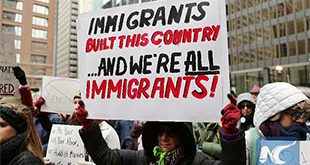The prospect of Kim unleashing one of his nuclear device only makes the potential outcomes more dire.
Joel Wit, a senior fellow at the US-Korea Institute at Johns Hopkins University, said the current conversation overstates the prospect of war.
“There are a lot of statements going back and forth that are escalating tensions, but in the real world, on the ground, particularly in North Korea but I suspect also in South Korea, life goes on,” he said.
Kim has not ordered the mobilization of work forces away from fields or factories, 38 North analyst Joe Bermudez noted, a move that could impact the upcoming harvest.
“Kim Jong-Un is not a stupid person,” Bermudez said. “It is unlikely that he would mobilize the nation at this point in time.”
– China and economic pressure –
The UN Security Council at the weekend passed a new set of sanctions against Pyongyang over its weapons program, including bans on the export of coal, iron and iron ore, lead and lead ore as well as fish and seafood.
The measures were approved unanimously — including by Russia and China, the North’s sole major ally.
Their fate hinges largely on China, which accounts for 90 percent of trade with North Korea but is suspected of failing to enforce past UN measures, even after voting in their favor.
Trump has repeatedly tried to pressure China into taking a harder line on North Korea, but Beijing is fearful of a collapse of Kim’s regime.
The Council on Foreign Relations’ Ratner said the North Korea issue is front and center in Beijing and suggested China is “probably more willing to evolve (than) where they’ve been in the past.”
– Back to the negotiating table –
North Korea has reportedly produced a nuclear warhead small enough to fit on its rockets, leading some to say the time for military action has already passed.
“There’s no room for anything else other than diplomacy,” said Jeffrey Lewis, arms control expert at the Middlebury Institute of International Studies.
“The window to attack them or convince them not to (develop the weapons) has closed.”
Through the 2000s, six-party talks among China, Russia, Japan, South Korea, North Korea and the US appeared to draw Pyongyang, then under the rule of Kim’s father Kim Jong-Il, toward some level of outside nuclear monitoring and a possible slowdown in their program.
But that process collapsed in 2009, and since gaining power two years later, Kim has dismissed the idea of talks.
 The Independent Uganda: You get the Truth we Pay the Price
The Independent Uganda: You get the Truth we Pay the Price



